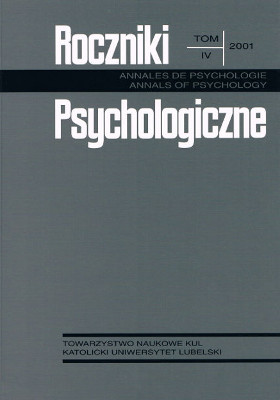On the Justification of Unethical Testing Practices, or on the Prevalence of Group Reasons on Individual Reasons
Abstract
The paper focuses on some issues important for testing practices (taking into consideration not the methodological point of view, i.e. important for the researcher, but also the ethical one, i.e. important for the researcher and for the subject). The crucial point here is to answer the following three questions: 1 – Is the subject entitled to complete information about the purposes of the test and its actual course? 2 – What shall we do to minimize stress for the OUB? 3 – What does it mean that the OUB cannot in some circumstances refuse to be tested?
To answer these questions it was very helpful to analyze the documents that regulate the ethical context of a scientific test (documents: D-1 – D-6, see Bibliography). According to the author, the formulations of ethical codes allow for the researcher's self-justification when he fails to abide by ethical standards.
References
American Psychological Association – Committee for the Protection of Human participants in Research (1982). Ethical principles in the Conduct of Research with Human Participants. Washington, DC: Author.
American Psychological Association (1992). Ethical Principles of Psychologist and Code of Conduct. Washington, DC: Author.
American Psychological Association (19944). Publication manual of the American Psychological Association. Washington, DC: Author.
American Psychological Association (2001a). APA Ethics Code Draft for Comment; http:// anastasi.apa.org/draftethicscode/draftcode.cfm
American Psychological Association (2001b). Rights and Responsibilities of Test Takers: Guidelines and Expectations; http://www.apa.org/science/ttrr.html
Berscheid, E., Baron, R. S., Dermer, M., Lebman, M. (1973). Anticipating informal consent: An empirical approach. American Psychologist, 28, 913-925.
Brzeziński, J. (19993). Metodologia badań psychologicznych. Warszawa: Wydawnictwo Naukowe PWN.
Kimmel, A. J. (1996). Ethical issues behavioral research. A survey. Cambridge, MA: Blackwell.
McDermott, M. (1995). Okrucieństwo, etyka i eksperymenty. Portret Philipa G. Zimbardo. Nowiny Psychologiczne, 4, 5-12.
O'Toole, K. (1997). The Stanford Prison Experiment: Still powerful after all these years. Stanford News, 1, 8, 97; http://www.stanford.edu/dept/news/relaged/970108prisonexp.html
Pacewicz, P., Zagórski, S. (1997). Z prof. Elliotem Aronsonem rozmawiają Piotr Pacewicz i Sławomir Zagórski. Gazeta Wyborcza. Magazyn, z dn. 22 grudnia 1997 r.; http://www.gazeta.pl/alfa/artykul.jsp?xx=199500&dzial=010698.html
Pacewicz, P., Zagórski, S. (2001). Z prof. Philipem Zimbardo rozmawiają Piotr Pacewicz i Sławomir Zagórski. Gazeta Wyborcza. Magazyn, z dn. 28 marca 2001 r.: http://www.gazeta.pl/alfa/artykul.jsp?xx=19947&dzial=010698.html
Polskie Towarzystwo Psychologiczne (1992). Kodeks Etyczno-Zawodowy Psychologa. Warszawa: PTP.
Rosenthal, R. (1984). Science and ethics in conducting, analyzing, and reporting psychological research. Psychological Science, 5, 127-134.
Sienkiewicz, A. (1997). Nieroztropna ankieta. Życie, nr 58 z dn. 6 grudnia 1997 r.
Copyright (c) 2001 Roczniki Psychologiczne

This work is licensed under a Creative Commons Attribution-NonCommercial-NoDerivatives 4.0 International License.


